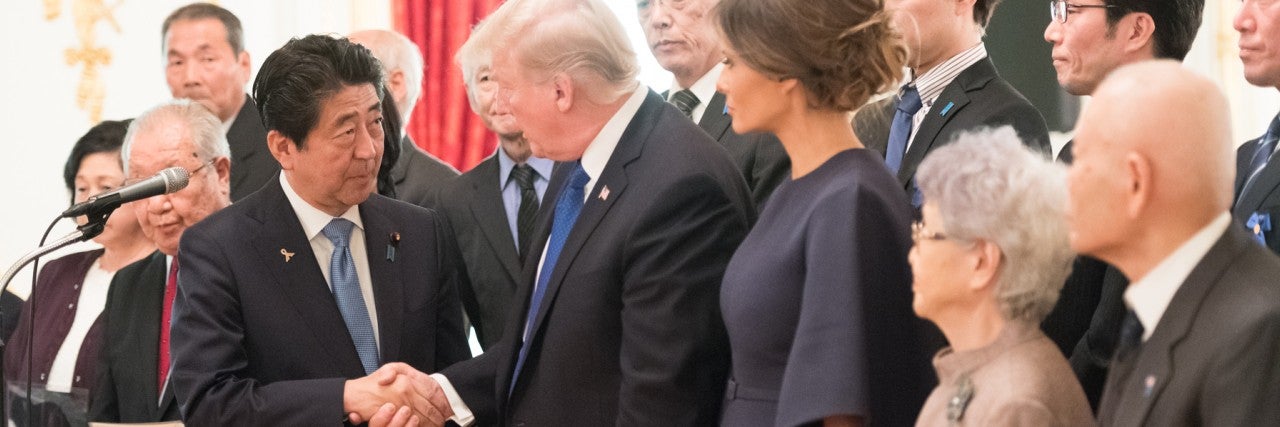December 1, 2017
This piece originally appeared in the Jewish Times Asia.
Last month, as President Trump stopped in Da Nang, Vietnam, to participate in the Asia-Pacific Economic Cooperation (APEC) Summit, an announcement was made that underlined just what the United States stands to lose—if it has not lost already—in the Asia Pacific region and at home if we continue on the course the president has set.
The countries comprising the TPP-11, parties to the formerly U.S.-led Trans-Pacific Partnership trade agreement that President Trump abandoned shortly after taking office, announced initial agreement on “core elements” of the pact that seeks to establish a rule-based order in the region, offering a counterweight to a power-based order. The latter, it goes without saying, is led by China. Let there be no mistake in messaging: with its withdrawal, Washington ceded leadership in the Asia Pacific region to China, a message heard clearly by our friends and allies, and by Beijing.
The decision by the TPP-11 still leaves the door open for the U.S. to eventually rejoin, a prospect vehemently rejected by the current administration – but one that AJC strongly supports. We remain hopeful that the Trump administration will recognize the advantages to the U.S. and find a way to rejoin, and thus reconfirm U.S. leadership in the region and in the world. Such a move would go far to restore traditional American pride and responsibility with a values- and principles-based leadership that benefits every citizen of the world. It would represent a foreign policy that truly puts America first.
Without the United States, the TPP-11 agreement, now called the Comprehensive and Progressive Agreement for Trans-Pacific Partnership (CPTPP), is weaker. Without the massive U.S. economy, the agreement goes from representing roughly 40 percent of the global economy to 13.5 percent. Arguably, with Japan, Australia, Vietnam, Malaysia and others in the mix, including some of the fastest growing economies in the world, the economic heft represented is not insignificant, but there is no doubt that its strength as a counterweight to Chinese influence is diminished. As importantly, the absence of the United States from the TPP sends a very real signal of U.S. intentions, not merely, as President Trump states, of his “America First” economic agenda, but notably, of a retreat from multilateral engagement and leadership.
This is a dangerous mistake with both short- and long-term repercussions for U.S. economic and geopolitical interests.
The TPP was to provide a comprehensive rule-based regime for trade in the region, including difficult negotiations on tariffs and protectionism that would open up markets and benefit American workers as much as it would benefit the other eleven countries involved. The agreement also set the “rules of the game” on intellectual property, human rights, environmental protection, labor rights - elements that benefited the United States, reinforced American standards and values, and granted U.S. companies access to markets on a level playing field. Without the United States as a TPP signatory, the leadership role in the region is effectively ceded to China, which is leading its own Regional Comprehensive Economic Partnership (RCEP). Without the U.S. as a signatory and leader of this multilateral agreement, the coming decades will show that the United States loses the most, on multiple fronts.
The Trump administration’s argument for withdrawing from the TPP was purely economic. It didn’t address the strategic justification, perhaps because it is impossible to argue that withdrawal has any strategic advantages. In fact, just the opposite is true.
U.S. withdrawal from the TPP confirmed the fears of our allies and friends in the Asia Pacific region that the U.S. commitment to the region is in word only, not in deed. The TPP pull-out signaled a reassessment of America’s role as a driver of economic growth and stability in a region that is a hub of maritime trade, including energy transportation critical to global interests, and rife with geopolitical tensions, security challenges, and threats.
Concerns about Washington’s commitment to the region have been voiced repeatedly to AJC over the last several years in the course of our repeated visits with political leaders, officials, and policy experts. Although U.S. investment in the region, along with our attention to its security and infrastructure needs, suffered under the Obama administration, since the Trump administration took office, fears expressed about American commitment and presence have taken on new urgency.
China’s increasing economic and military assertiveness across the region, coupled with the perceived American withdrawal, is causing real anxiety. And the anxiety is not unwarranted. No visit to any country in the Indo-Pacific can ignore the very active presence of Chinese commercial and political influence.
As part of its Belt and Road Initiative (BRI), China is pouring billions of dollars into the development and infrastructure of countries along the old Silk Road, linking it with Europe. With the BRI, China has also steadily built a “string of pearls” around the Indian Ocean, increasing its access to ports and airports, and expanding its ties and influence, all to China’s long-term economic and political benefit, and not necessarily to the benefit of the countries themselves.
China’s geopolitical strategy is steadily advancing its role as the powerbroker in the neighborhood, while the U.S. is seemingly doing all it can to accelerate its own decline.
It is not too late for the U.S. administration to recognize its error, to choose to decisively advance U.S. interests in the Asia Pacific region, and rejoin the TPP. In this vital region as elsewhere around the world, it is demonstrably in our economic and political interests to remain engaged, and to retain America’s rightful role as leader, (imperfectly executed on occasion, to be sure) of the free world, guided by a set of values and principles that strive for prosperity, justice, equality, fairness, and respect for all.
Shira Loewenberg is Director of the American Jewish Committee’s Asia Pacific Institute.
Photo Credit: The White House



